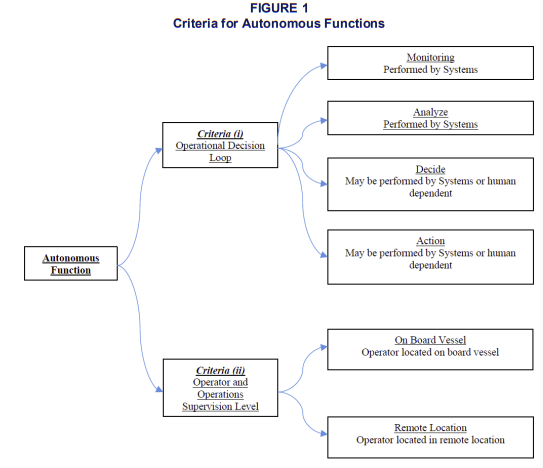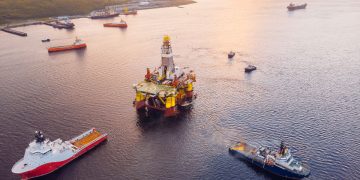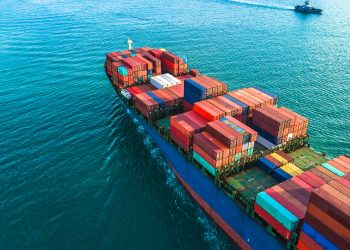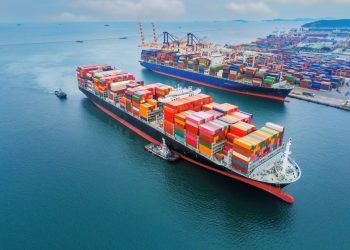ABS issued a new Guide for Autonomous and Remote-Control Functions aiming to provide the industry with technical and survey requirements for marine vessels and offshore units fitted with autonomous or remote control functions.
Development of the guidance was informed by experiences on remote-control and autonomous operations tug projects in Europe, Asia and the Americas. The Guide’s goal-based framework also covers interactions with relevant stakeholders such as port authorities and other vessels. The Guide uses a risk-based approach to determine the requirements for the assessment and implementation of autonomous and remote-control functions. Marine vessels and offshore units installed with autonomous or remote control functions are to comply with the requirements given in this Guide. They will be eligible for the class notations AUTONOMOUS or REMOTE-CON.
Autonomous functions: Requirements

Operational Decision Loop
The monitoring, analysis and decision stages of the operational decision loop are to be carried out by systems / machines. The action stage may be carried out by systems/machines or humans.
- The function is to demonstrate a level of situational awareness of the process it is executing (Monitoring)
- The function is to be able to evaluate the inputs which it is receiving (Analyze)
- The function is to be able to offer up options for the course of action and decide based on the options provided by the Function (Decision)
- The function is to be able to execute the decision (Action). Alternatively, this stage may be carried out by humans
Operator and Operations Supervision Level
An operator is to be designated and will have responsibility over the Autonomous Function. The operator may be physically located onboard the vessel or in a remote location. The operator station is to be constantly manned.
- The operator is to supervise the function executions either continuously, periodically or as needed
- The operator is to be able to intervene, override, and take over the operation when deemed necessary by the operator.
Concept of Operations Document (CONOPS)
[smlsubform prepend=”GET THE SAFETY4SEA IN YOUR INBOX!” showname=false emailtxt=”” emailholder=”Enter your email address” showsubmit=true submittxt=”Submit” jsthanks=false thankyou=”Thank you for subscribing to our mailing list”]
A Concept of Operations document (CONOPS) in accordance with Subsection 3/2 is to be submitted for review. It is acknowledged that in the implementation process, the CONOPS is an evolving document. A draft CONOPS is to be submitted at the beginning of the project. At the completion of the verification and validation phase, a final and comprehensive CONOPS is to be submitted for approval. The CONOPS is to identify and consider, but is not limited to:
- Necessary logistical support for the operation of the autonomous function.
- Maintenance activities of the function and system(s) required for the operation of the autonomous function.
- Operational risk factors and mitigating measures for the autonomous function.
- The limitations and operating boundaries of the autonomous function.
- Procedures for transfer of control are clearly defined and documented.
- Emergency response and rescue procedures.
- Description of the number of personnel, roles and responsibilities, and organizational structure at the Remote Operator location.
- Qualifications and training requirements of the Remote Operator. Any personnel involved in the operations of the function at the Remote Operator location are to be appropriately qualified and experienced to conduct the operations of the Function. This is to be agreed upon with the Flag Administration.
- Interactions and interface between the Remote Operator and external systems and entities. Examples are interactions with Vessel Traffic Systems or other vessels.
- Cybersecurity precautions at the Remote Operator station that affect the location security, and which will prevent potential corruption of the autonomous function through the Remote Operator station.
- The limitations and operating boundaries of the conduct of operations from the Remote Operator location.
Risk assessment
Risk assessment reports carried out in accordance with the risk assessment plan are to be submitted for review. Risks and effects pertaining to the following are to be assessed:
- Integration of the function with other onboard functions and systems
- Interaction and interfacing between the function with external systems and entities for example with a port Vessel Traffic Systems or other vessels
- Failure of the function on the vessel and its wider environment
- Equipment or system failure
- Operational hazards
The risk assessment(s) are to consider, but are not limited to:
- Impact of implementation of the autonomous function upon related functions carried out by systems or humans. This may be in the form of design modifications of the affected functions or amendments to operational procedures.
- System-of-systems impact of the autonomous function on the overall vessel.
- Impact of failure of the function on the vessel and wider environment.
- Operational risk factors and mitigating measures for the conduct of operations from the Remote Operator location have been identified and considered.
- Impact of failure of the Remote Operator Station on the vessel and wider environment have been identified and considered.
The risk assessment(s) are to show that the vessel is not to descend into an uncontrollable situation in the event of the following:
- failure of the function
- system-of-systems impact on the vessel
- impact of failure or other event on the function
- occurrence of foreseeable hazard.

































































